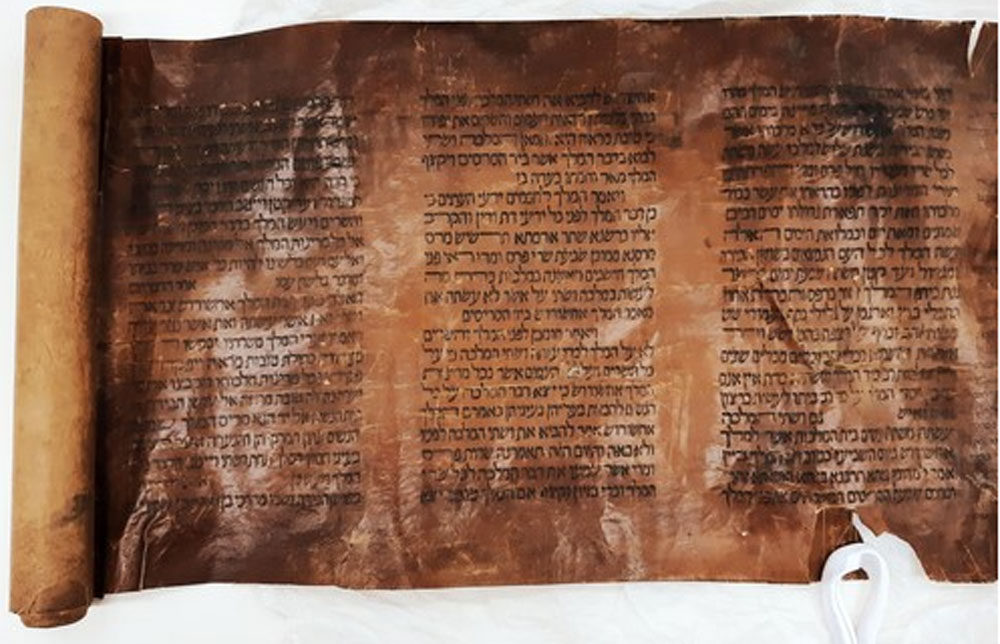Hebrew Words in Hebrew Wordplay
Biblical Hebrew is a small language compared to English which along with the borrowed words, and scientific, medical and legal terms borrowed from Greek and Roman languages is estimated to have about two and a half million words. The number of attested Hebrew words however is 8198, of which some 2000 are words that occur only once in the Hebrew Scripture. That makes Hebrew indeed a very small language. Yet, Hebrew as the tongue of the Creation, has words that are full of deep meaning. That makes Hebrew language very concise expressing much in few words, as one can come to this conclusion by simply comparing a Hebrew text to its English translation.

Rare 15th-century scroll of Esther. The National Library of Israel in Jerusalem. The only book in the Tanach in which the Name of the Eternal does not appear in the text.
Unlike most other languages, which are based on conventions, the Hebrew words are based on a root that contains three letters. Variations of this root produce words with distinct meanings. Each letter in the Hebrew alphabet carries a certain meaning, and the true meaning of any Hebrew word can be contrived from the total sum of the meanings of the root letters.
The other thing the inquisitive reader needs to know is that there are no vowels in Hebrew language, only consonants. Thus, the readers of script in the ancient times had only context and oral tradition as a guide for properly vocalizing the text. Vowels points were added some time after the first millennium C.E. by scribes called “Masoretes” to preserve the received reading tradition.
With that said, below we will show how some Hebrew words work in puns.
The word לָבָן Lavan, which means “white”, is the name of a villain in the Bible, the father-in-law of Ya’akov, and the father of Leah, Rachel, Zilpah and Bilhah, (according to the received tradition, Bilhah and Zilpah were sisters, as the daughters of Lavan’s concubine). לָבָן Lavan, read in reverse, gives נָבָל naval, which means “wicked”, “villain” but also “stupid”.
A descendant of Ya’akov through his son לֵוִי Levi, “joined”, is מֹשֶׁה Mosheh, which name has the meaning of “drawing out” (of the water). The etymology of the root of the word mosheh cannot be found in the Scripture, therefore it is speculated to be of an Egyptian origin. But Mosheh could also mean “son” in Egyptian, as the daughter of Pharaoh had adopted him as her son. Josephus gives a different explanation in his book “Against Apion”, wherein he says, “His true name was Moüses, and signifies a person who is rescued from the water, for the Egyptians call water Moü”. Hence, the dictionaries have adopted this meaning of מֹשֶׁה Mosheh, and have shown it to have come from the primitive verb מָשָׁה mashah, to pull out (literally or figuratively), to draw out. But the name of the greatest leader of Israel, by which he is known throughout the Torah, is the one which Bityah, the daughter of Pharaoh, called him, and even the Eternal approved this name and called him by no other name. The name בִּתְיָה Bityah, means “Daughter of Yah”, because of her compassion and pity in saving the baby. Bityah is identified in “his wife Yehudiyah” (see 1Ch 4:18 and also read this article) signifying that she became one of the tribe of Yehudah, leaving behind the idolatry of Egypt. The received tradition also records that she was not affected by the ten plagues, and she was the only female firstborn of Egypt to survive.
Mosheh is an exact opposite of Lavan. The name מֹשֶׁה Mosheh, read in reverse, means HaShem, literally, “the Name” [referring to the Name of the Eternal]. The Hebrew word שֵׁם shem, “name”, comprises the central letters of the word נְשָׁמָה neshamah, which means “soul”. נְשָׁמָה neshamah is the third soul of five which a human can have. They are in an ascending order from the lowest to the highest: nefesh, ruach, neshamah, chayah, and yechidah. The etymological connection of the Hebrew words שֵׁם shem and נְשָׁמָה neshamah teaches that one’s name relates to who he or she is in essence. Put in different words, shem, one’s name, is the channel through which the soul reaches the body: the window into the inner being. The letters of the word shem, supplied with a different vowel, can be read as שָׁם sham, which means “there”.
The Hebrew שֵׁם word shem, “name” functions as a theme of the narrative in Gen 11:10-32. Shem’s descendants settled in the plain of Shinar and dwelt there: שָׁם sham, “there” (Gen 11:2), sham plays on shem, “name” and the proper name Shem, the son of Noach. “There” is not just a place or location but a word that points to the person’s destiny in life: “there” as where one is heading for. And where one is heading for is not death, which in Hebrew is מָוֶת mavet. Read in reverse, the word מָוֶת mavet gives the Hebrew word תֹּם tom, which means “innocence, wholeness, purity”, but also “simplicity”; tom can also mean “end”.
Knowledge known to only a few will die out. If you feel blessed by these teachings of Time of Reckoning Ministry, help spread the word!
May we merit seeing the coming of our Mashiach speedily in our days!
This page contains sacred literature and the Name of the Creator. Please, do not deface, discard, or use the Name in a casual manner.
